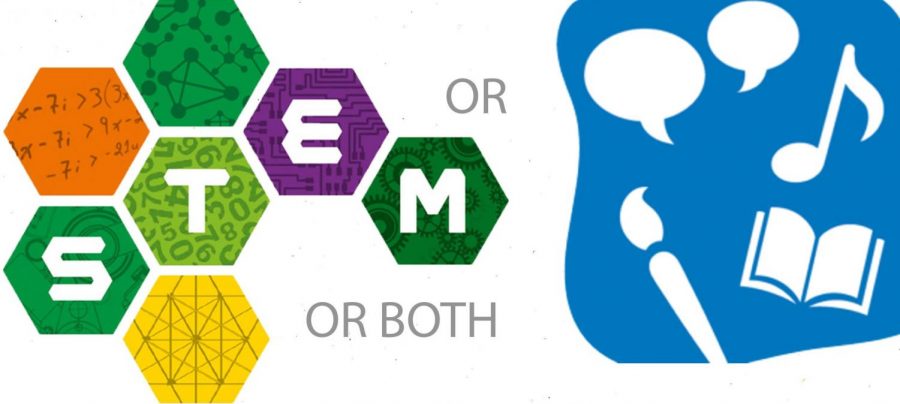OPINION: STEM, liberal arts majors are both necessary
Both fields have their respective merits for students, you should follow your passion when deciding on a major
While the competition between STEM and liberal arts rages, it’s important to consider the benefits of both, and the many opportunities they can offer different students, engineers and artists alike.
September 3, 2020
STEM fields are amazing. There are so many things engineers can do and so many advancements to be made. Thinking about how far computers have come as I type this is impressive, much less some of the other things that have been achieved in the scientific fields.
Humanities are equally amazing, too. Reading about the history of assassination or looking at beautiful art from historical artists like Hokusai to current artists like Amy Sherald — there is no shortage of topics to explore. As someone who started off as a chemistry major and later switched to English and history, I find there are some distinct issues in how the two fields are promoted.
I adored chemistry, in theory, yet I hate math. I should have thought about switching earlier, but I heard many people say things like, “Engineering is the best way to make a living, being an artist is like dooming yourself to poverty” or “Studying history? What are you going to do, teach?”
I was too focused on what I thought was expected of me to think about what I would enjoy doing. I had experiences with science and tech being held out to me on a silver platter, as the pinnacle of good work. The humanities, on the other hand, were banished to a dusty box in the corner.
Alexander Jensen, senior psychology and creative writing double major, said what high schools promote depends on the region they are in and what gets funding. In his experience, he said a decent amount of the Advanced Placement courses were within the humanities.
“It shouldn’t be a focus on the fields, it should be a focus on what the person wants,” Jensen said.
Jensen said both passion and monetary gain are important when deciding on a career path, but versatility is also especially important when choosing a major.
“Starting somewhere that is going to allow you to jump around a lot is useful, and I think both humanities and STEM fields can do that,” Jensen said.
Jensen said there needs to be more of an emphasis on passion rather than having things feel like a competition between STEM and humanities.
Wendy Yu, senior chemical engineering major, said she feels WSU seems more focused on science and technology research, after listening to language professors talking about funding being cut back in their departments.
In order to have both scientific and artistic advancement, Yu said it is important to give attention to both sides of the coin and encourage job diversity. She said that even if it isn’t always obvious, there is an overlap between the two.
“I think passion should definitely come first,” Yu said. “Of course finance is an important factor too, but if you are going into a field just because of the money it could bring you, you might not be happy with your job.”
Humanities majors can also go into politics or law, she said. The stereotypical belief that humanities translate to only a teaching career is not something she can agree with, she said.
It is less the institution that is at fault for the pressure to take a certain path in life and more an issue with society or individuals in our lives who apply that pressure to us.
“The further back in someone’s development you go, the more important things are,” Jensen said. “High school needs to carry more of the responsibility. College serves a big role in honing and crafting the image of yourself, but that image is really going to emerge in high school.”
Yu said offering career coaching and having professionals speak about their careers is another great way to try and encourage students to consider both options fully.
Both the sciences and the humanities are important, but I don’t want to see more students do what I did and neglect even considering other options because they were blinded by foolish generalizations.






















